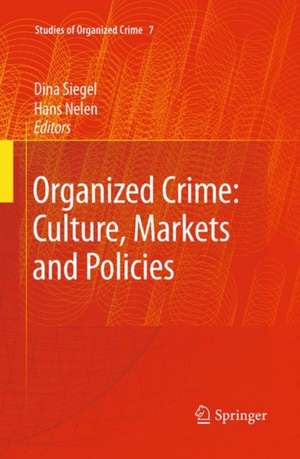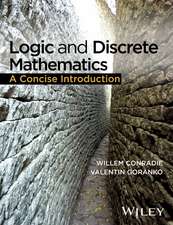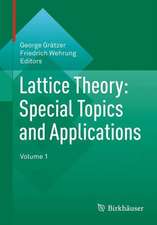Organized Crime: Culture, Markets and Policies: Studies of Organized Crime, cartea 7
Editat de Dina Siegel, Hans Nelenen Limba Engleză Paperback – 8 aug 2008
| Toate formatele și edițiile | Preț | Express |
|---|---|---|
| Paperback (1) | 384.86 lei 6-8 săpt. | |
| Springer – 8 aug 2008 | 384.86 lei 6-8 săpt. | |
| Hardback (1) | 392.21 lei 6-8 săpt. | |
| Springer – 16 noi 2007 | 392.21 lei 6-8 săpt. |
Din seria Studies of Organized Crime
- 15%
 Preț: 643.16 lei
Preț: 643.16 lei -
 Preț: 394.51 lei
Preț: 394.51 lei - 15%
 Preț: 636.12 lei
Preț: 636.12 lei - 15%
 Preț: 642.03 lei
Preț: 642.03 lei - 15%
 Preț: 646.62 lei
Preț: 646.62 lei - 15%
 Preț: 650.86 lei
Preț: 650.86 lei - 18%
 Preț: 790.14 lei
Preț: 790.14 lei - 15%
 Preț: 637.59 lei
Preț: 637.59 lei - 18%
 Preț: 889.92 lei
Preț: 889.92 lei - 15%
 Preț: 641.03 lei
Preț: 641.03 lei - 15%
 Preț: 524.36 lei
Preț: 524.36 lei - 18%
 Preț: 781.94 lei
Preț: 781.94 lei - 18%
 Preț: 892.28 lei
Preț: 892.28 lei - 15%
 Preț: 637.46 lei
Preț: 637.46 lei - 18%
 Preț: 1853.06 lei
Preț: 1853.06 lei - 18%
 Preț: 1115.14 lei
Preț: 1115.14 lei - 15%
 Preț: 642.51 lei
Preț: 642.51 lei - 15%
 Preț: 641.20 lei
Preț: 641.20 lei
Preț: 384.86 lei
Nou
Puncte Express: 577
Preț estimativ în valută:
73.64€ • 77.10$ • 60.93£
73.64€ • 77.10$ • 60.93£
Carte tipărită la comandă
Livrare economică 05-19 aprilie
Preluare comenzi: 021 569.72.76
Specificații
ISBN-13: 9780387097107
ISBN-10: 0387097104
Pagini: 230
Ilustrații: VIII, 230 p.
Dimensiuni: 155 x 235 x 13 mm
Greutate: 0.34 kg
Ediția:2008
Editura: Springer
Colecția Springer
Seria Studies of Organized Crime
Locul publicării:New York, NY, United States
ISBN-10: 0387097104
Pagini: 230
Ilustrații: VIII, 230 p.
Dimensiuni: 155 x 235 x 13 mm
Greutate: 0.34 kg
Ediția:2008
Editura: Springer
Colecția Springer
Seria Studies of Organized Crime
Locul publicării:New York, NY, United States
Public țintă
Lower undergraduateCuprins
Criminal Groups and Activities.- Reflections on the Sicilian Mafia: Peripheries and Their Impact on Centres.- The Decline of the Italian Mafia.- Hashish Smuggling by Bedouin in South Sinai.- Corruption as a Causal Factor in Human Trafficking.- New Players in an Old Game: The Sex Market in Italy.- The Vehicle Theft Market in Bulgaria.- Diamonds and Organized Crime:The Case of Antwerp.- Eco-Crime: The Tropical Timber Trade.- The Role of Hawala Bankers in the Transfer of Proceeds from Organised Crime.- Facilitating Organized Crime: The Role of Lawyers and Notaries.- Law Enforcement.- Criminal Conflicts and Collective Violence: Biker-Related Account Settlements in Quebec, 1994–2001.- Controlling Human Smuggling in the Netherlands: How the Smuggling of Human Beings Was Transformed into a Serious Criminal Offence.- The Civil RICO Law as the Decisive Weapon in Combating Labour Racketeering.- Recent Anti-Mafi a Strategies: The Italian Experience.- Breaking the Power of Organized Crime? The Administrative Approach in Amsterdam.
Notă biografică
Dina Siegel is an Assistant Professor at the Department of Criminology and Criminal Law, Vrije Universiteit Amsterdam. She studied sociology and social anthropology at Tel Aviv University in Israel and obtained her PhD in cultural anthropology at the Vrije Universiteit of Amsterdam, the Netherlands. She has studied and published several articles on post-Soviet organized crime, terrorism, human trafficking, criminal activities in diamond sector, and on drug policies in the Netherlands. In 2003 she edited (together with Van de Bunt and Zaitch) Global Organized Crime. Trends and Developments (Kluwer Academic Publishers, 2004). She conducted ethnographic research on Russian-speaking criminals in the Netherlands, Russian biznes in the Netherlands (2005, Meulenhoff).
Hans Nelen is a criminologist and has a law degree. Between 1986 and the beginning of 2001 he was employed as a senior researcher and research supervisor at the Research and Documentation Centre of the Ministry of Justice in the Netherlands (WODC), mainly investigating drug crime, fraud and corporate crim. Between 2001 and 2006 he was a senior lecturer and senior researcher at the Institute of Criminology of the Vrije Universiteit Amsterdam. Since January 1 2007 Nelen has been working as a Professor of Criminology at Maastricht University (UM). During the last decade Nelen published several books and articles on a variety of criminological subjects, i.e. corruption and fraud, dilemmas facing lawyers and notaries, the administrative approach to organized crime, the proceeds-of-crime approach, evaluation of legislation, and evaluation of law enforcement activities.
Hans Nelen is a criminologist and has a law degree. Between 1986 and the beginning of 2001 he was employed as a senior researcher and research supervisor at the Research and Documentation Centre of the Ministry of Justice in the Netherlands (WODC), mainly investigating drug crime, fraud and corporate crim. Between 2001 and 2006 he was a senior lecturer and senior researcher at the Institute of Criminology of the Vrije Universiteit Amsterdam. Since January 1 2007 Nelen has been working as a Professor of Criminology at Maastricht University (UM). During the last decade Nelen published several books and articles on a variety of criminological subjects, i.e. corruption and fraud, dilemmas facing lawyers and notaries, the administrative approach to organized crime, the proceeds-of-crime approach, evaluation of legislation, and evaluation of law enforcement activities.
Textul de pe ultima copertă
Complex interactions of economic, technological, political, and cultural factors have fed the rise of criminal networks worldwide. At the same time, global illegal activities depend on a world of social realities to function. Organized Crime moves beyond traditional concepts of "evil forces" corrupting their host societies, instead analyzing local, national, and international manifestations of organized crime in the situational contexts that aid in its development.
The contributors provide up-to-date understanding of various aspects of organized crime, in both classic areas of research (drugs, sex trafficking, labor racketeering) and emerging areas of interest (diamond smuggling, money laundering, eco-crime), in locales as varied as Italy, Quebec, the Sinai, Bulgaria, and the world’s tropical rain forests. Topics are explored from a variety of perspectives, including sociology, criminology, political science, and anthropology, giving this book empirical breadth and depth rarely seen in the literature.
A sampling of the topics:
The contributors provide up-to-date understanding of various aspects of organized crime, in both classic areas of research (drugs, sex trafficking, labor racketeering) and emerging areas of interest (diamond smuggling, money laundering, eco-crime), in locales as varied as Italy, Quebec, the Sinai, Bulgaria, and the world’s tropical rain forests. Topics are explored from a variety of perspectives, including sociology, criminology, political science, and anthropology, giving this book empirical breadth and depth rarely seen in the literature.
A sampling of the topics:
- Symbolic and economic meanings of crime to cultures.
- The symbiotic relationships between legitimate and criminal activities.
- Ethical dilemmas of legitimate businesses with criminal clients.
- Marketing, problem-solving, recruitment: organizational models of criminal enterprises.
- Innovative law enforcement/administrative strategies for containing and preventing crime in the U.S. and across Europe.
Caracteristici
Examines organized crime in many different trades, from diamond dealing, to drug smuggling, to car theft Combines historical data with recent research to analyze current trends in organized crime Research examines and compared organized crime circles throughout the world Includes supplementary material: sn.pub/extras














